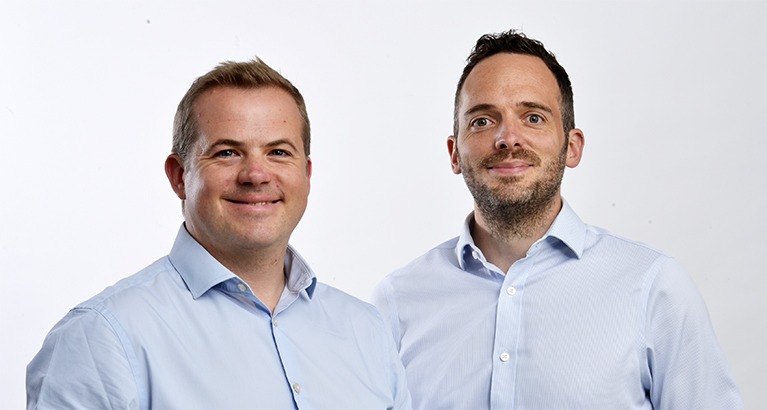When 37-year-old Matt Ash’s mother was diagnosed with dementia 3 years ago, he faced a scenario familiar to many. His mum lived alone, he and his 2 siblings lived a couple of hours drive away, and he was juggling the needs of a young family. When he discovered his mother had been living without heating for a week because she couldn’t explain the situation to Matt and his brother and sister, he decided to design a remote monitoring system to help other people facing the same challenges.
“People with dementia struggle with communication and you don’t have that window about what’s going on at home,” he explains. “Unless you have that day-to-day context, it’s very difficult to unpick what they’re trying to tell you. Families really need help in understanding what’s going on, to be able to intervene, but also knowing when to press go on professional care and accessing a higher level of expertise.”
Global effort to develop technology to support those living with dementia
Matt’s vision was shared by his friend, 39-year-old James Brown, and the long-term friends created Supersense Technologies. The pair both have a background in electronic engineering and met while studying for their PhDs at University College London.
In April they were awarded £80,000 by the Longitude Prize on Dementia to develop a monitoring product to support people with dementia to live independently, by offering personalised insights to their families and carers. They are one of 24 teams of developers, researchers, and innovators from across the world to secure this Discovery Award grant, funded by Alzheimer’s Society and Innovate UK and delivered by Challenge Works. The competition was co-designed with people living with dementia.
“Our hypothesis is that while there’s great digital tech out there, for someone living with dementia it isn’t quite right as you’ve got to remember to wear and charge it, and engage with it,” says Matt. “A common theme with dementia is that technology starts to become really difficult to work with. I’ve seen that with my mum. We want to develop a device which sits in the home unobtrusively observing, without hampering how someone goes about their daily life. Crucially, we’re avoiding video and audio, so it doesn’t impact the person’s privacy and dignity.”
How backgrounds in product development and military strategy are combining to find a solution
The pair will now design a prototype and bring a unique set of skills to the table. Matt, from Reading, UK, went into product development consultancy for medical devices after completing his doctorate. James, originally from Shropshire, worked for the Ministry of Defence for a decade, becoming Chief of Staff of the Innovation Directorate and also spent 13 years serving as an Army Reservist.
“It was invaluable experience”, James says. “It taught me about solving problems. Thinking about people, process, and technology, and setting a strategy and driving it forward. It’s a secret weapon in this sphere.”
James also has a personal interest in mental health, and was already a trustee of a charity, which involved shadowing dementia advisers going into homes, which has provided an invaluable insight to the issue.
Business plan based on comprehensive outreach work with families and medical professionals
The award allows the co-founders to work alongside people living with dementia and their carers to ensure the prototype they deliver is intuitive, easy-to-use, and able to adapt to people’s changing needs. James and Matt have conducted in-depth interviews with people living with dementia, family, clinicians, and professional carers. They have also carried out a lengthy survey and have been struck by how families are currently trying to solve the problem by using off-the-shelf technology such as cameras, smoke alarms and smart devices such as Amazon’s “Alexa” system – while monitoring it all using multiple apps on their phone.
“With an aging population, and a care workforce struggling to keep pace with that level of demand, we think the family carer will have a bigger role in long-term care. There is a real problem facing families, but there’s not currently a solution,” says James, the CEO of Supersense Technologies. “People are having to bootstrap their own ways of dealing with this. The common theme we’re finding is that it’s just such a difficult problem to navigate, any help is welcome. Some of the clinical advice we’ve had is that if we introduce too much with monitoring we can ‘over-care’ at a time when professionals need to be brought in, so we need to find the right balance.”
Unique challenge presented by dementia not easily solved by latest technological developments
Supersense Technologies is based in Cambridge and there are now 3 of them in the team. While developments in AI and sensing are helping them upscale their capabilities, trying to create some sort of model for an individual living with dementia is very difficult.
“A lot of the AI out there at the moment is based on training,”, explains Matt, the CTO. “Image recognition relies on people labelling images, so AI can figure out what the image is when it’s shown a new one. In this case, there is nothing to train on. There’s simply not enough information. And every person is different, and every person’s dementia will progress in a different way. It’s a unique challenge and a great application for unsupervised learning.
Mentoring and business theory provided by the Accelerate Programme
The venture is supported by the Accelerate Programme at the Entrepreneurship Centre of Cambridge Judge Business School, which provided the co-founders with mentoring and helped deliver a pitch for the award.
“Accelerate Cambridge delivered business theory, but what underpinned it was the fact it was delivered by people going through the same journey, just they were three or four years ahead of us,” says James. “You can have the theory, but what was really great was having people who had tested the theory. The Cambridge ecosystem is also unbelievable. Having so many successful founders on tap in the same area is brilliant, and there is a willingness to have a coffee and share that expertise.”
“As a father of young children the nursery and school network is also amazing,” adds Matt. “I can talk to someone and they’re a director at AstraZeneca or legal counsel at a global startup, so you can get all this advice just by talking to parents at drop off and pick up.”
Chance for venture to win £1 million in finals of the Longitude Prize
Matt and James now progress to the next stage of the Longitude Prize. In 2024, five of the 24 semi-finalists will each be awarded an additional £300,000 to build a real-world prototype. One of those five will then go on to win a £1 million first prize, to be awarded in 2026. In total, more that £3 million will be awarded in seed funding and development grants.
“By addressing dementia the Longitude Prize tackles a global health crisis,” says Indro Mukerjee, the CEO of Innovate UK. “Worldwide around 50 million people have dementia and there are nearly 10 million new cases every year.”
“It’s vital people with dementia are able to live independently, doing things that bring them fulfilment, for as long as possible,” adds Kate Lee, CEO of the Alzheimer’s Society. “And that’s exactly what tech innovation can provide. The Discovery Award winners all have the capacity to develop cutting-edge tools that bring hope to the here and now, making a tangible difference to people’s lives.”
“We’re playing to win,” says James. “We want to show we can provide value to people with lived experience and are building up our pilot scheme in Cambridge. We’re also developing a strong business plan, and through the Accelerate Cambridge programme we’re devising a route for it to become a sustainable product. It’s about solving the problem and solving it as a sustainable business.”
Accelerate Cambridge
The Accelerate Cambridge programme, run by Cambridge Judge’s Entrepreneurship Centre, provide teams of entrepreneurs a structured approach across a 10-week programme combining online lectures, workshops, weekly coaching and mentoring.
Related content
Supersense Technologies is a startup supported by the Accelerate Cambridge programme at Cambridge Judge’s Entrepreneurship Centre. They are based in Cambridge aim to revolutionise how we care for our ageing population.





